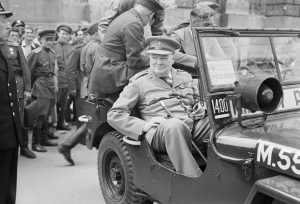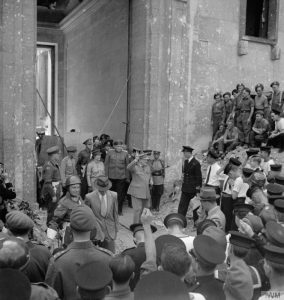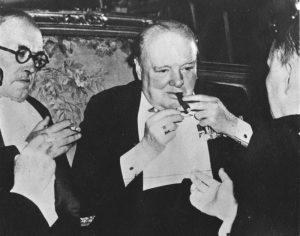
Finest Hour 170
“A Crime Without a Name” – Churchill, Zionism, & the Holocaust
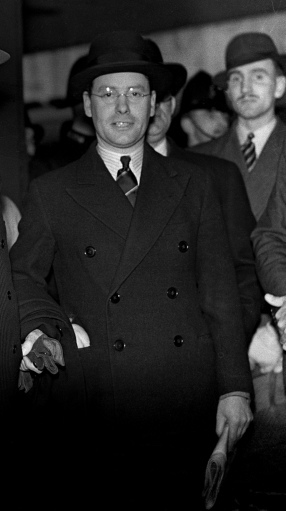
December 3, 2015
Finest Hour 170, Fall 2015
Page 06
By David Patterson
Professor David Patterson holds the Hillel A. Feinberg Chair in Holocaust Studies in the Ackerman Center for Holocaust Studies at The University of Texas at Dallas.
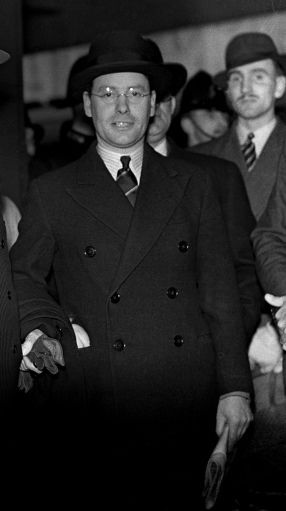
Sir Winston Churchill was known for his foresight. Just as he saw the gathering storm over Europe long before the Second World War broke out, so he understood early on the singularity of what we now call the Holocaust, Shoah, Churban, Final Solution, Judenvernichtung, or simply, in Paul Celan’s words, “that which happened.”1 In his radio broadcast of 24 August 1941, just two months after the Einsatzgruppen killing units began the systematic murder of the Jewish people, Churchill announced that Jews in “whole districts are being exterminated,” adding, “We are in the presence of a crime without a name.”2

2024 International Churchill Conference
Well before the Nazis were gassing and burning Jews in the six extermination camps a year later, Churchill understood that what was to be called the Holocaust was something more than mass murder, something more than the annihilation of a people.3 Unlike most others, he had some sense of just what the Nazis set out to exterminate in their total extermination of the Jews, from Tromsø to Tunis, namely, the millennial teaching and testimony that the Jewish people represent by their very presence in the world.
Churchill’s insight into this aspect of the nameless crime can be seen in his view of the Zionists’ effort to seek a haven for the Jews in the Land of the Covenant. When as First Lord of the Admiralty he first met with Zionist leader Chaim Weizmann on 19 September 1914, he compared Weizmann to “an Old Testament prophet.”4 On 8 November 1931 the Sunday Chronicle published his piece “Moses: The Leader of a People.” Moses, said Churchill, was “the greatest of the prophets, who spoke in person to the God of Israel” and “received from God that remarkable code upon which the religious, moral, and social life of the nation was so securely fastened.”5
Drawing a parallel between the Exodus and the Zionist movement of his contemporary world, “Churchill drew a further, yet more chilling, analogy,” notes Jonathan Rose: “Ultimately, he concluded, the Pharaoh resorted to genocide: the murder of Hebrew male infants. At this time the British press was aware of, and generally repelled by, Hitler’s anti-Semitism, but it is difficult to think of anyone else who foresaw that it would end in Holocaust….Churchill may have been the first to make that connection, consciously or unconsciously.”6 Even then he knew that the conflict to come was of metaphysical proportions, one in which good was to collide with evil.
Sacred History
Churchill’s sense of sacred history informed his view of Zionist history, as well as his understanding of the implications of the Holocaust. His undying support for the Balfour Declaration of 2 November 1917, in which Arthur Balfour assured the Zionists of Britain’s commitment to the establishment of a Jewish national home in Palestine, was based on his realization that from such a haven, the Jewish people might once again emanate the light of the “remarkable code” of Moses unto the nations. Thus in his speech of March 1921 on Mount Scopus in Jerusalem he declared to the Jews, “The hope of your race for so many centuries will be gradually realized here, not only for your own good but for the good of all the world.”7
Years later, standing before the House of Commons in January 1949, Churchill averred, “The coming into being of a Jewish State in Palestine is an event in world history to be viewed in the perspective not of a generation or a century, but in the perspective of a thousand, two thousand, or even three thousand years.”8 In the words of Martin Gilbert, “no petty calculation of ephemeral diplomatic loss or gain drew him to Zionism; for him it belonged to the great tide of history.”9 For Churchill, the great tide of history was the tide of sacred history. This understanding of Zionism shaped Churchill’s understanding of the Holocaust.
The German Pogrom
On 13 April 1933, right after Hitler’s Nazi government had passed a law barring Jews from political office, Churchill warned the House of Commons that all hope for a German democracy “has been swept away. You have a dictatorship—a most grim dictatorship.”10 In the course of 1933 the Nazis passed a series of anti-Semitic laws designed ultimately to legislate the Jews out of existence. By the end of 1933 approximately 37,000 of Germany’s 523,000 Jews had left; by September 1939 the number of German Jews fleeing their homeland rose to 282,000.11 Most of them, however, were unable to get out of Europe; when thirty-two countries convened the Evian Conference on 6 July 1938 to address the Jewish refugee problem, they decided to table that item of discussion. The world had closed its doors to the Jews even as steps toward the extermination of European Jewry proceeded apace.
The infamous Nuremberg Laws were passed on 15 September 1935, thirty thousand Jews were arrested on Kristallnacht on 9–10 November 1938, and, following the invasion of Poland on 1 September 1939, the first ghetto was established in Piotrków on 28 October. Such was the context in which the British, holding the League of Nations Mandate in Palestine, dealt with their own Jewish Question.
Britain’s Jewish Question
Arab unrest in Palestine was also part of the conundrum in which the British found themselves as the Nazis moved steadily towards war. It began when Haj Amin al-Husseini incited the first riots against the Jews in April 1920 and again in May 1921, just after he had been appointed Mufti of Jerusalem. When Churchill received an Arab delegation in 1921 asking him to repudiate the Balfour Declaration, he refused. A year later he issued the White Paper of 1922 reassuring the Arabs that the Balfour Declaration would deprive them of nothing, saying that the Jews had a place in their ancestral lands “as of right not of sufferance….For the fulfillment of this policy it is necessary that the Jewish community in Palestine should be able to increase its numbers by immigration.”12 Riots broke out again in 1929 and culminated in the Mufti’s Arab Revolt of 1936–39, as the Jewish refugee crisis continued to intensify.
On 11 November 1936 the Peel Commission arrived in Palestine to explore causes and solutions to the Arab unrest. On 25 November Chaim Weizmann testified before the Commission, saying, “Today almost six million Jews…are doomed to be pent up in places where they are not wanted, for whom the world is divided into places where they cannot live and places where they cannot enter.”13 Quick to perceive the urgency of the situation, on 24 March 1936 Churchill urged Parliament to allow as many Jews into Palestine as necessary.14 Addressing the Peel Commission on 12 March 1937, he insisted, “We did not adopt Zionism entirely out of altruistic love of starting a Zionist colony: it was a matter of great importance to this country [Britain].”15
Heeding Churchill’s admonition, on 7 July 1937 the Peel Commission published its report; the commissioners recognized the threat posed to the Jews who were desperate to leave Europe and asserted that “restrictions on Jewish immigration will not solve the Palestine problem.”16 Although at the time Churchill opposed it, the Commission recommended partition as the only viable solution to the tensions between the Jews and the Arabs.17 Desperate for a safe haven, the Jews reluctantly favored the recommendation, and the Arabs refused it with a vehemence that led to Malcolm MacDonald’s White Paper of 1939.
Shutting the Door
The House of Commons approved the White Paper on 23 May by a vote of 268 to 179. It allowed 75,000 Jewish immigrants to enter Palestine over a period of five years—the years of the extermination of European Jewry—after which Jewish immigration would require Arab consent. In the halls of Parliament, “Churchill spoke with force and bitterness against what he believed was both a betrayal of the Balfour Declaration and a shameful act of appeasement.”18 “To whom was the pledge of the Balfour Declaration made?” Churchill asked.
It was not made to the Jews of Palestine, it was not made to those who were actually living in Palestine. It was made to world Jewry…to that vast, unhappy mass of scattered, persecuted, wandering Jews whose intense, unchanging, unconquerable desire has been for a National Home….So far from being persecuted, the Arabs have crowded into the country and multiplied till their population has increased more than even all world Jewry could lift up the Jewish population. Now we are asked to decree that all this is to stop and all this is to come to an end. We are now asked to submit—and this is what rankles most with me—to an agitation, which is fed with foreign money and ceaselessly inflamed by Nazi and Fascist propaganda.19
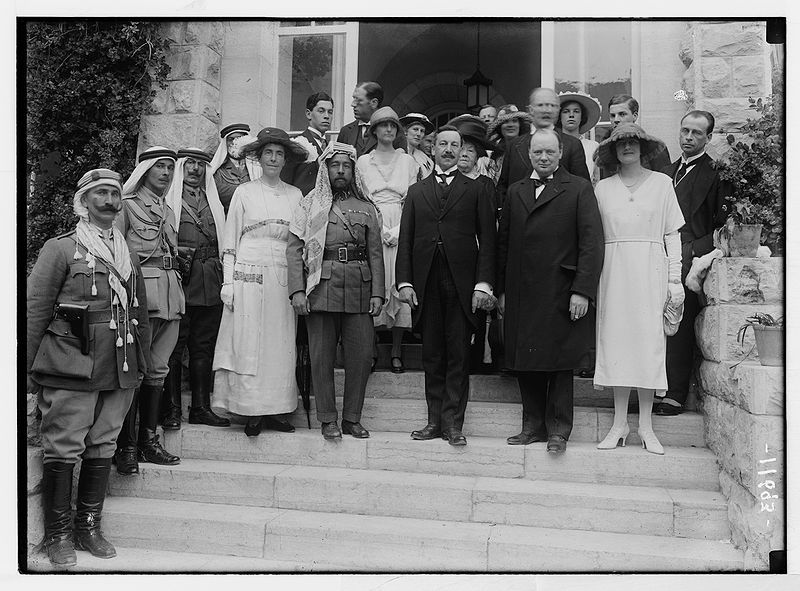
Al-Husseini’s instigation of the Arab Revolt of 1936–39 is well known; what is not so well known and what Churchill knew is that without funding from Germany, the Mufti could never have engineered the uprising, as he himself later asserted.20 The bond between the Muslims of Palestine and Nazi propaganda can also be seen in the fact that during the Arab revolt they distributed Arabic language leaflets decorated with the swastika.21 This intimate bond between National Socialism and the Jihadist revolt was rooted in their mutual hatred of the Jews. The Nazi-Jihadist bond of Jew hatred ran so deep that on 18 June 1936 Vicco von Bülow-Schwante of the German Foreign Ministry informed the German Embassy in Cairo that “the Nuremberg race laws are aimed only at the Jews,” something of which Churchill was well aware.22
Equally aware of Nazi intentions to exterminate the Jews, Churchill insisted that throughout the war “no permanent restriction on Jewish immigration should be imposed” and that “the future of Palestine should be determined at a peace conference after the war.”23 Just days following his speech before Parliament opposing the MacDonald White Paper, on 27 May, the MS St. Louis, carrying 915 Jewish refugees from Germany, arrived in Havana, only to be refused entry; the United States also turned the refugees away, and Britain allowed only 288 to disembark. Of those who remained, 227 were murdered by the Nazis.24 The Jews were trapped, and, to his dismay, Churchill knew it.
Britain’s Zionist Prime Minister
At a meeting of the War Cabinet on 12 February 1940 Churchill pushed for arming the Jews of Palestine and enlisting them in the war effort, but to no avail.25 His urging that the Jews should possess arms to protect themselves from Arabs sympathetic to the Nazi project of extermination also fell on deaf ears.26 “In Churchill’s mind, the Jewish fate in Europe and the Jewish future in Palestine were inextricably linked….At no point during his wartime premiership were Churchill’s sympathies to Zionist aspirations shared by the majority of his Cabinet.”27
Once again Churchill stood alone on the right side of history. This time, however, he was able to do something about it: in 1943 he managed to effect a change in British policy that enabled several thousand Jews to enter Palestine from the Balkans, irrespective of quotas.28 Further, in 1944 Churchill promoted the establishment of a military contingent of Jews from Palestine.29 On 3 July of that year the British government consented, and on 20 September the formation of such a unit was announced. Wearing the yellow star as their insignia, the soldiers of the Jewish Brigade took part in the Spring Offensive of 1945. They searched for Holocaust survivors, provided them with aid, and assisted in their immigration to Palestine. They played a key role in the efforts to help Jews escape Europe for British Mandated Palestine, an effort many of its members were to continue after the Brigade disbanded.
Meanwhile the Warsaw Ghetto was sealed on 15 November 1940. On 1 March 1941 SS head Heinrich Himmler ordered the construction of Birkenau. On 31 July Hermann Göring ordered Reinhard Heydrich to proceed with the implementation of the Final Solution. On 28 November 1941 Haj Amin al-Husseini had his first meeting with Adolf Hitler to discuss the extermination of the Jews. On 8 December Chelmno extermination camp went into operation. Then came the Wannsee Conference on 20 January 1942, where Heydrich convened fourteen ministers of the Reich to discuss the logistics of the extermination of the Jews of Europe. And so the other extermination camps carried out the directive from Berlin: Sobibor, Belzec, and Birkenau in March, Majdanek in April, and Treblinka in June. Whereas the Jews of Palestine longed to join the fight, and Churchill was their advocate, the Jews did not wait but staged their own uprisings: the Warsaw Ghetto Uprising on 19 April 1943, the uprising in Treblinka on 2 August, in Sobibor on 14 October, in Birkenau on 7 October 1944, and in Chelmno on 17 January 1945.
The Prophet of Truth
Throughout the war years Churchill’s voice was the loudest in sounding the alarm and raising the outcry over the Nazis’ systematic annihilation of the Jewish people. On 14 November 1941, after reports on the actions of the Einsatzgruppen had been released, he wrote to the Jewish Chronicle: “None has suffered more cruelly than the Jews the unspeakable evils wrought on the bodies and spirits of men by Hitler and his vile regime. The Jew bore the brunt of the Nazis’ first onslaught upon the citadels of freedom and human dignity. He has borne and continues to bear a burden that might have seemed to be beyond endurance.”30 Yes, bodies and spirits: Churchill understood, when very few others could fathom it, the targeting not only of the body but also of the soul of Israel—that is what was at stake in the Zionists’ cause: not just the lives of human beings but the very meaning and sanctity of the life of the human being, as affirmed by the millennial testimony of the Jewish people to all of humanity.
Soon after the mass deportations to the extermination camps were underway, Churchill declared before the House of Commons on 8 September 1942 that the Nazis were engaged in “the most bestial, the most squalid and the most senseless of all their offences…. This tragedy fills me with astonishment as well as with indignation, and it illustrates as nothing else can the utter degradation of the Nazi nature and theme.”31
Churchill followed this speech with a letter dated 29 October 1942 to William Temple, Archbishop of Canterbury: “The systematic cruelties to which the Jewish people—men, women, and children—have been exposed under the Nazi regime are amongst the most terrible events in history, and place an indelible stain upon all who perpetrate and instigate them. Free men and women denounce these vile crimes, and when this world struggle ends with the enthronement of human rights, racial persecution will be ended.”32 At a time when few among the leaders of the world raised their voices specifically on behalf of the Jews, Churchill made it clear that the Jews were singled out as victims.
Supporting the Promised Land
Once the war had come to an end, notes Martin Gilbert, “the establishment of a Jewish State in Palestine would be one of [Churchill’s] main post-war tasks and challenges, and…he had the historical justification as well as the determination and skill to bring the State into being.”33 By that time Churchill had become the Leader of the Opposition to the new Prime Minister Clement Attlee. The Jews of Palestine declared statehood on 14 May 1948. However, Gilbert points out, “after six months of Jewish statehood Britain’s Labour Government still refused to recognise the State of Israel. On 3 October 1948, during a speech at a Conservative Party rally in North Wales, Churchill declared, ‘The Socialists, more than any other Party in the State, have broken their word in Palestine and by indescribable mis-management have brought us into widespread hatred and disrepute there and in many parts of the world.’”34
While the United Kingdom’s de facto recognition of the Jewish State came on 13 May 1949, its de jure recognition was delayed until 28 April 1950. In that same year, notes Jonathan Rose, “Israel’s ambassador to Britain would report that Churchill spoke warmly of how the Jews organized their survival for millennia around the Old Testament. Churchill urged the new state to ‘preserve close association with the book’— speaking as someone whose statecraft had always been closely associated with books.”35
Sir Winston Churchill’s sense of history was informed by a sense of sacred history grounded not only in books but also in the Book. Not only was he a friend to the Jewish people in the Zionists’ effort to escape the horrors of the Holocaust, but he joined them in their centuries-old testimony to the very human sanctity and human dignity that the Nazis targeted for extermination. Far more profoundly than any other leader among the Allies, Churchill fought a war not only against the German army but also against the Nazis’ systematic extermination of the Jews. While he may not have been able to put a stop to the murder of the Six Million, he never ceased to affirm the unfathomable significance of the emergence of the Jewish State from the ashes. In 1961, thirty years after he had penned his piece “Moses: The Leader of a People,” he gave a copy of the article to Israeli Prime Minister David Ben-Gurion.36
Endnotes
1. Paul Celan, “Speech on the Occasion of Receiving the Literature Prize of the Free Hanseatic City of Bremen,” in Collected Prose, trans. Rosemarie Waldrop (New York: Routledge, 2003), p. 33.
2. Martin Gilbert, Churchill and the Jews: A Lifelong Friendship (New York: Henry Holt and Company, 2007), p. 186.
3. The six camps designed specifically for the extermination of the Jews were Chelmno, Majdanek, Sobibor, Belzec, Treblinka, and Auschwitz-Birkenau; all of them were located in Poland.
4. Gilbert, Churchill and the Jews, p. 95.
5. Ibid.
6. Jonathan Rose, The Literary Churchill: Author, Reader, Actor (New Haven, CT: Yale University Press, 2014), p. 178.
7. Martin Gilbert, Israel: A History (New York: William Morrow and Company, 1998), pp. 40–41.
8. William D. Rubinstein, “Winston Churchill and the Jews,” Jewish Historical Studies, 39 (2004): p. 174.
9. Gilbert, Churchill and the Jews, p. 306.
10. Ibid., p. 99.
11. “German Jewish Refugees, 1933–1939,” Holocaust Encyclopedia, United States Holocaust Memorial Museum, available at http:// www.ushmm.org/wlc/en/article.php?ModuleId=10005468.
12. “British White Paper (1922),” in Lenny Flank, ed., The Arab-Israeli Conflict: A Documentary History of the Struggle for Peace in Palestine (St. Petersburg, FL: Red and Black Publishers, 2010), p. 47.
13. Chaim Weizmann, The Letters and Paper of Chaim Weizmann (New Brunswick, NJ: Transaction Publishers, 1984), p. 102.
14. Gilbert, Churchill and the Jews, p. 109.
15. Ibid., p. 112.
16. “The Peel Commission Report,” in Flank, ed., The Arab-Israeli Conflict, p. 70.
17. Ibid., pp. 78–79.
18. Gilbert, Churchill and the Jews, p. 158.
19. Robert Rhodes, ed., Churchill Speaks, 1897–1963: Collected Speeches in Peace and War (New York: Chelsea House, 1980), p. 686.
20. Matthias Küntzel, Jihad and Jew-Hatred: Islamism, Nazism and the Roots of 9/11, trans. Colin Meade (New York: Telos Press, 2007), p. 31.
21. Matthias Küntzel, “National Socialism and Anti-Semitism in the Arab World,” Jewish Political Studies Review (17, Spring 2005), available at http://www.jcpa.org/phas/phas-kuntzel-s05.htm.
22. Jeffrey Herf, Nazi Propaganda for the Arab World (New Haven, CT: Yale University Press, 2009), p. 19.
23. Gilbert, Churchill and the Jews, p. 167.
24. Robert Rosen, Saving the Jews: Franklin D. Roosevelt and the Holocaust (New York: Thunder’s Mountain Press, 2006), p. 103.
25. Gilbert, Israel: A History, pp. 103–04.
26. Gilbert, Churchill and the Jews, p. 170.
27. Ibid., pp. 188–89.
28. Gilbert, Israel: A History, p. 115.
29. Gilbert, Churchill and the Jews, p. 217.
30. Martin Gilbert, The Holocaust: A History of the Jews of Europe during the Second World War (New York: Henry Holt and Company, 1985), pp. 231–32.
31. Ibid., pp. 450–51.
32. Ibid., p. 485.
33. Gilbert, Churchill and the Jews, p. 238.
34. Ibid., p. 278.
35. Rose, The Literary Churchill, p. 180.
36. Gilbert, Churchill and the Jews, p. 96.
Subscribe
WANT MORE?
Get the Churchill Bulletin delivered to your inbox once a month.
